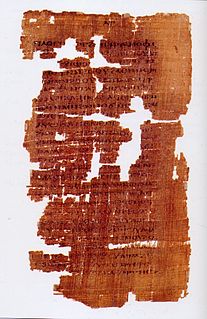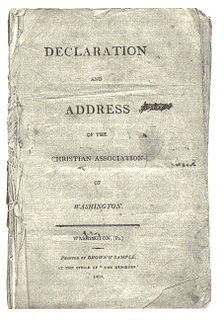Related Research Articles

Archimedes of Syracuse was a Greek mathematician, physicist, engineer, astronomer, and inventor from the ancient city of Syracuse in Sicily. Although few details of his life are known, he is regarded as one of the leading scientists in classical antiquity. Considered to be the greatest mathematician of ancient history, and one of the greatest of all time, Archimedes anticipated modern calculus and analysis by applying the concept of the infinitely small and the method of exhaustion to derive and rigorously prove a range of geometrical theorems, including: the area of a circle; the surface area and volume of a sphere; area of an ellipse; the area under a parabola; the volume of a segment of a paraboloid of revolution; the volume of a segment of a hyperboloid of revolution; and the area of a spiral.

Gospel originally meant the Christian message, but in the 2nd century it came to be used also for the books in which the message was set out. In this sense a gospel can be defined as a loose-knit, episodic narrative of the words and deeds of Jesus, culminating in his trial and death and concluding with various reports of his post-resurrection appearances. Modern scholars are cautious of relying on the gospels uncritically, but nevertheless, they do provide a good idea of the public career of Jesus, and critical study can attempt to distinguish the original ideas of Jesus from those of the later authors.

Justin Martyr was an early Christian apologist and philosopher.
A quotation is the repetition of a sentence, phrase, or passage from speech or text that someone has said or written. In oral speech, it is the representation of an utterance that is introduced by a quotative marker, such as a verb of saying. For example: John said: "I saw Mary today". Quotations in oral speech are also signaled by special prosody in addition to quotative markers. In written text, quotations are signaled by quotation marks. Quotations are also used to present well-known statement parts that are explicitly attributed by citation to their original source; such statements are marked with quotation marks.
There are in all 283 direct quotations from the Hebrew Bible in the New Testament. In about 90 instances, the Septuagint is quoted literally. In around 80 further instances, the quote is altered in some way. For example, at Matthew 21:42 Jesus says "Did ye never read in the scriptures that the stone which the builders refused is become the head stone of the corner?", a reference to Psalm 118:22. Likewise, Mark 12:10. The Epistle of Jude quotes the pseudepigraphal Book of Enoch and the Assumption of Moses. Other quotations are sometimes made directly from the Hebrew text.
A string literal or anonymous string is a type of literal for the representation of a string value in the source code of a computer program. In modern programming languages, this is usually a quoted sequence of characters, as in x = "foo", where "foo" is a string literal with value foo – the quotes are not part of the value, and one must use a method such as escape sequences to avoid the problem of delimiter collision and allow the delimiters themselves to be embedded in a string. However, there are numerous alternate notations for specifying string literals, particularly more complicated cases, and the exact notation depends on the individual programming language in question. Nevertheless, there are general guidelines that most modern programming languages follow.

The Invisible Pink Unicorn (IPU) is the goddess of a parody religion used to satirize theistic beliefs, taking the form of a unicorn that is paradoxically both invisible and pink. She is a rhetorical illustration used by atheists and other religious skeptics as a contemporary version of Russell's teapot, sometimes mentioned in conjunction with the Flying Spaghetti Monster.

The Epistle of Barnabas is a Greek epistle written between AD 70 and 132. The complete text is preserved in the 4th-century Codex Sinaiticus, where it appears immediately after the New Testament and before the Shepherd of Hermas. For several centuries it was one of the "antilegomena" writings that some Christians looked on as sacred scripture, while others excluded them. Eusebius of Caesarea classified it as such. It is mentioned in a perhaps third-century list in the sixth-century Codex Claromontanus and in the later Stichometry of Nicephorus appended to the ninth-century Chronography of Nikephoros I of Constantinople. Some early Fathers of the Church ascribed it to the Barnabas who is mentioned in the Acts of the Apostles, but it is now generally attributed to an otherwise unknown early Christian teacher, perhaps of the same name. It is distinct from the Gospel of Barnabas.

Biblical inerrancy is the belief that the Bible "is without error or fault in all its teaching"; or, at least, that "Scripture in the original manuscripts does not affirm anything that is contrary to fact". Some equate inerrancy with biblical infallibility; others do not. The belief is of particular significance within parts of evangelicalism, where it is formulated in the "Chicago Statement on Biblical Inerrancy".

The Gospel of the Hebrews, or Gospel according to the Hebrews, was a Jewish–Christian gospel. The text of the gospel is lost with only fragments of it surviving as brief quotations by the early Church Fathers and in apocryphal writings. The fragments contain traditions of Jesus' pre-existence, incarnation, baptism, and probable temptation, along with some of his sayings. Distinctive features include a Christology characterized by the belief that the Holy Spirit is Jesus' Divine Mother and a first resurrection appearance to James, the brother of Jesus, showing a high regard for James as the leader of the Jewish Christian church in Jerusalem. It was probably composed in Greek in the first decades of the 2nd century, and is believed to have been used by Greek-speaking Jewish Christians in Egypt during that century.

Exsurge Domine is a papal bull promulgated on 15 June 1520 by Pope Leo X. It was written in response to the teachings of Martin Luther which opposed the views of the Church. It censured forty-one propositions extracted from Luther's Ninety-five Theses and subsequent writings, and threatened him with excommunication unless he recanted within a sixty-day period commencing upon the publication of the bull in Saxony and its neighboring regions. Luther refused to recant and responded instead by composing polemical tracts lashing out at the papacy and by publicly burning a copy of the bull on 10 December 1520. As a result, Luther was excommunicated in 1521.

Richard Albert Mohler Jr. is an American evangelical theologian, the ninth president of The Southern Baptist Theological Seminary in Louisville, Kentucky, and host of the podcast The Briefing, where he daily analyzes the news and recent events from a evangelical perspective. He has been described as "one of America's most influential evangelicals".
Eisegesis is the process of interpreting text in such a way as to introduce one's own presuppositions, agendas or biases. It is commonly referred to as reading into the text. It is often done to "prove" a pre-held point of concern, and to provide confirmation bias corresponding with the pre-held interpretation and any agendas supported by it.
The Latin adverb sic inserted after a quoted word or passage indicates that the quoted matter has been transcribed or translated exactly as found in the source text, complete with any erroneous, archaic, or otherwise nonstandard spelling, punctuation, or grammar. It also applies to any surprising assertion, faulty reasoning, or other matter that might be interpreted as an error of transcription.

Dual-covenant or two-covenant theology is a school of thought in Christianity regarding the relevance of the Hebrew Bible, which Christians call the Old Testament.
In contrast to the variety of absolute or personal names of God in the Old Testament, the New Testament uses only two, according to the International Standard Bible Encyclopaedia.
Quotation marks, also known as quotes, quote marks, speech marks, inverted commas, or talking marks, are punctuation marks used in pairs in various writing systems to set off direct speech, a quotation, or a phrase. The pair consists of an opening quotation mark and a closing quotation mark, which may or may not be the same character.

De Doctrina Christiana is a theological treatise of the English poet and thinker John Milton (1608–1674), containing a systematic exposition of his religious views. The Latin manuscript "De Doctrina" was found in 1823 and published in 1825. The authorship of the work is debatable. In favor of the theory of the non-authenticity of the text, comments are made both over its content, as well as since it is hard to imagine that such a complex text could be written by a blind person However, after nearly a century of interdisciplinary research, it is generally accepted that the manuscript belongs to Milton. The course of work on the manuscript, its fate after the death of the author, and the reasons for which it was not published during his lifetime are well established. The most common nowadays point of view on De Doctrina Christiana is to consider it as a theological commentary on poems.

The Declaration and Address was written by Thomas Campbell in 1809. It was first published in Washington, Pennsylvania in 1809. It was the founding document for the Christian Association of Washington, a religious association that was a precursor to the Restoration Movement. In many ways, Thomas Campbell was before his time. He had an ecumenical spirit long before the ecumenical movement began. The Declaration and Address is a testimony to his appeal for Christian unity.
A proof is sufficient evidence or a sufficient argument for the truth of a proposition.
References
- ↑ "Definition of PROOF TEXT". www.merriam-webster.com. Retrieved 2019-09-19.
- ↑ "The Use of a Doctrinal Catechism in Sunday-School Instruction: A Symposium", Jesse L. Hurlbut et al; The Biblical World, Vol. 16, No. 3 (Sept 1900); retrieved via JSTOR
- ↑ "Problem with Proof-Texting". Covenant of Love. 2010-03-24. Retrieved 2013-11-14.
- ↑ "problems with proof-texting (1)". Peripatetic Learning. Carlsweatman.wordpress.com. 2010-08-04. Retrieved 2013-11-14.
- ↑ "Is Bible Verse Proof-Texting Problematic?". Mainsailministries.org. Retrieved 2013-11-14.
- ↑ McDonough, Kathy (2012-07-19). "The Subtle Power of Spiritual Abuse, Chapter 7: Abuse and Scripture". Recovering Grace. Retrieved 2013-11-14.